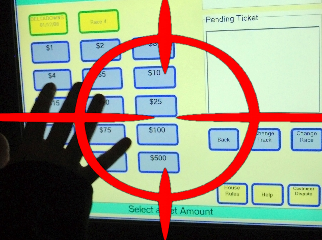 Those opposed to sports betting kiosks set up in establishments holding restricted gambling licenses in Nevada scored a victory over their opponents when the measure, Senate Bill 416, cleared the state Senate earlier this week after getting approved through an 18-3 vote.
Those opposed to sports betting kiosks set up in establishments holding restricted gambling licenses in Nevada scored a victory over their opponents when the measure, Senate Bill 416, cleared the state Senate earlier this week after getting approved through an 18-3 vote.
The bill, which is being pushed by the Nevada Resort Association, is looking to forbid the use of these sports betting machines from small establishments who only hold restricted gambling licenses. According to the NRA, these sports bars aren’t supposed to have those sports kiosks because they’re not exactly the slot and video poker machines that are entitled to those kinds of establishments. They’re mobile sports books, the NRA argued, and as such shouldn’t be allowed because sports books are only reserved for casinos that carry non-restricted gambling licenses.
Should SB416 be approved, these sports betting kiosks would be prohibited in these small establishments that carry restricted gambling licenses.
Despite the setback, opponents of the bill continue to argue that the amount of people who wager and the money they spend aren’t significant enough to affect the bottom line from the major casinos. The revenue these sports kiosks generate compared to what the casinos make from sports betting are peanuts, amounting to less than 10 percent (about $600,000) to the tens of millions of dollars that are being wagered in sports books.
Sean Higgins, representing the Nevada Restricted Gaming Association and one of the most vocal opponents of SB416, pointed to what he considered as big casinos trying to crush whatever competition lay in its path, no matter how small they may be. “If you’re too successful, people are going to try to push you back down,” he said during a testimony at an earlier hearing before the Senate Judiciary Committee.
Keith Lee, a Reno lawyer and lobbyist for William Hill, echoed those sentiments, explaining to the Associated Press that public policy on these kinds of issues should reflect what’s really going on in the market, particularly the effects – or lack thereof – these kiosks have on all the major sports books in the state.
Particularly troubling for opponents of the bill is the effects it would have on changing definitions on what’s allowed and what’s not allowed for these establishments with restricted gambling licenses. If SB416 is passed, the definition of kiosks, in particular, would fall under a race book or a sports pool, which would then require a separate license for these establishments. Compare that to its current definition under existing law as “associated equipment”, and you can see why both sides are determined to win this battle.
But with the bill passing the state Senate, it looks like advocates of the bill have the inside track on the issue, a development that should provide legitimate cause for concern for its opponents.
